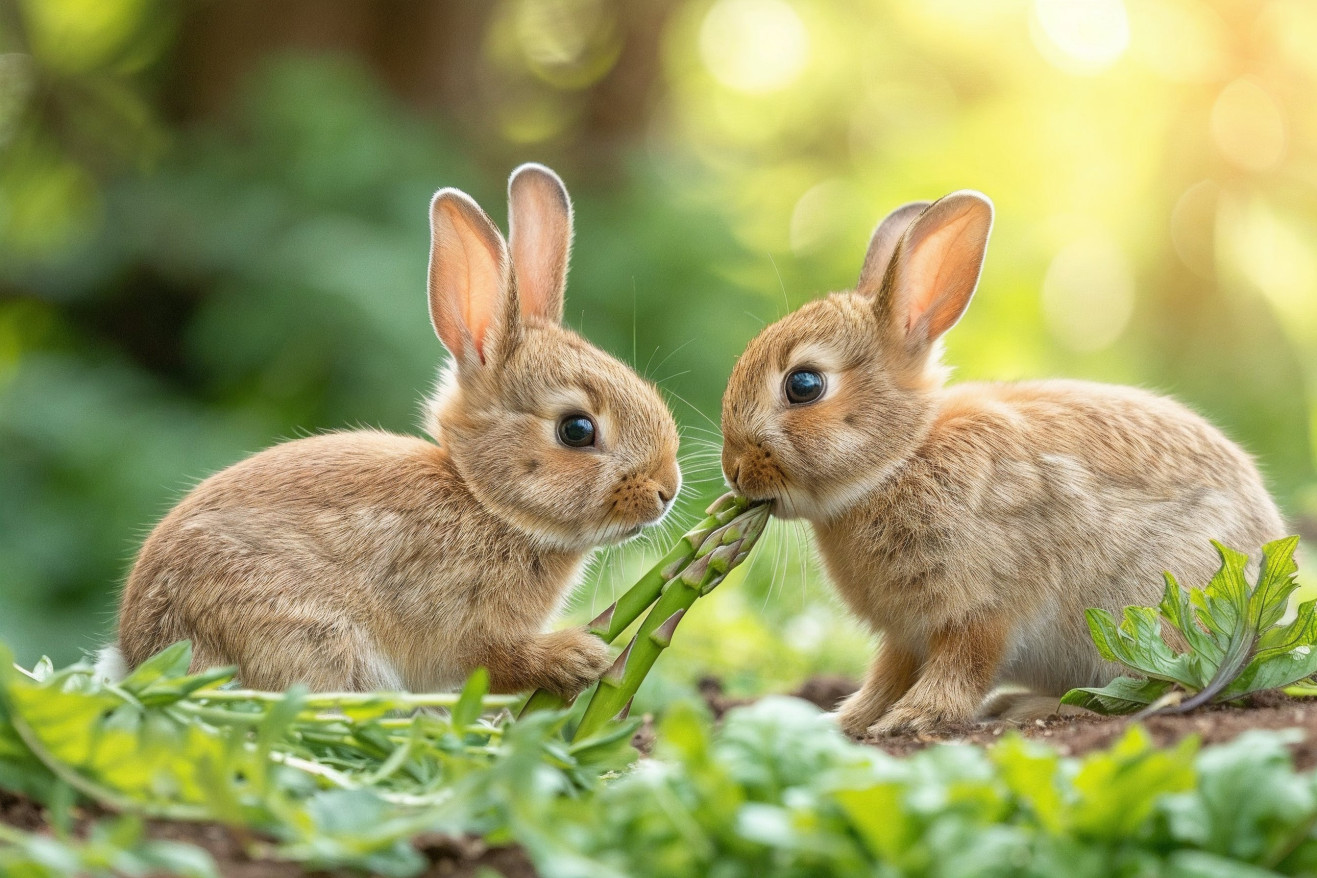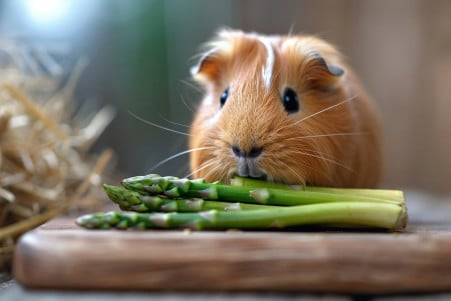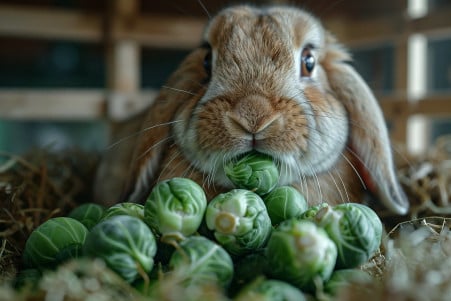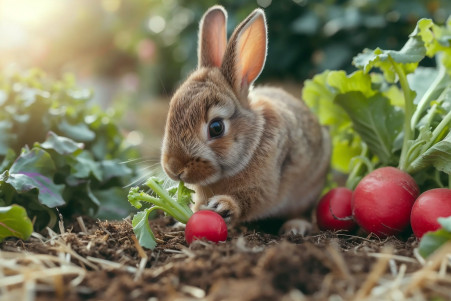Can Rabbits Eat Asparagus? Dietary Tips for Your Pet Bunny
29 January 2024 • Updated 31 January 2024

Asparagus is a nutritious vegetable for people, but it can also be good for rabbits if it’s fed to them in the right way. Yes, rabbits can eat asparagus in moderation. Asparagus is low in sugar and high in fiber, which is good for a rabbit’s digestive system. However, it should be fed in small amounts and introduced slowly to prevent digestive upset.
To learn more about how asparagus fits into a rabbit’s diet, we’ll take a look at studies by veterinarians and rabbit nutritionists that cover everything from the rabbit digestive system to the nutrients in asparagus and any health benefits or concerns. This will give you a thorough understanding of how to safely add asparagus to your rabbit’s diet so that you can feel confident you’re doing what’s best for your pet.
Can rabbits eat asparagus?
What Do Rabbits Eat? A Guide to Rabbit Nutrition
Rabbits have specific nutritional requirements that are important for their overall health and well-being. According to Oxbow Animal Health, high-quality grass hay should make up approximately 70% of a rabbit’s diet and is considered the foundation of their diet.
Fresh vegetables and leafy greens should make up about 8–10% of a rabbit’s diet and provide important nutrients like vitamins A, B, C, K, and various minerals. The remaining 10–15% of a rabbit’s diet should be made up of pelleted food that is specific to the rabbit’s species and age and provides concentrated nutrients.
Vegetables are considered supplemental but important in a rabbit’s diet. The RSPCA and Rabbit Welfare Association & Fund note that a variety of leafy greens should be included to ensure that rabbits get a variety of flavors and textures and to ensure that they get enough water.
However, one of the biggest misconceptions about rabbit nutrition is that rabbits can live on vegetables alone, but this is not true. Hay is important for their digestive health.
It’s important to take a slow approach when adding new foods, like asparagus, to a rabbit’s diet to avoid gastrointestinal issues. This means that you should start with small amounts and monitor your rabbit for any changes in their behavior or the consistency of their stool.
This will help you ensure that you’re not upsetting the balance of their digestive system, which is designed to process plant material that is high in fiber. By following these dietary guidelines, rabbit owners can help prevent gastrointestinal issues and promote their rabbits’ overall well-being.
Inside the Rabbit’s Digestive System: A Complex Machine
The rabbit’s digestive system is a wonder of evolution, specifically adapted to process the tough, fibrous plant material that makes up their diet.
According to Companion Animals, rabbits are able to process large amounts of fibrous plants that would be indigestible to many other animals.
This is because their digestive system is set up for fast food passage, which is necessary to process the large amounts of plant material they eat.
In addition to supporting the rabbit’s digestive system, a high-fiber diet also supports their dental health. The fibrous material in their diet helps to wear down their constantly growing teeth. However, according to Standlee Premium Western Forage, if rabbits aren’t given enough high-quality fiber in their diet, they can experience digestive issues like stasis, bloat, and ileus. These issues can lead to more serious health concerns, including gas and intestinal blockages.
Knowing these specific dietary needs, we can choose the right vegetables to help support their sensitive digestive systems. Asparagus, which is high in fiber, may be a good choice, especially if it’s introduced to the rabbit’s diet slowly to avoid any sudden changes that could disrupt their complex digestive system.
Asparagus in a Rabbit’s Diet: Go for It, but With Caution
As long as it’s prepared properly and given in moderation, rabbits can eat asparagus. Vet Explains Pets suggests using fresh asparagus, washing it well, and cutting it into small pieces that are easy for rabbits to eat. Asparagus’s fiber content makes it a good fit for rabbits’ diets, and it’s packed with important nutrients like vitamins A, C, E, and K, as well as dietary fiber, which is important for their digestive systems.
That said, there are some potential downsides. If rabbits eat too much asparagus, it can lead to digestive problems like diarrhea or cecotropes that aren’t being eaten. Every Bunny Welcome recommends introducing asparagus to rabbits’ diets slowly and adjusting the amount based on the rabbit’s size, noting that a few small pieces every day or every other day, three to four times a week, is plenty.
It’s important to watch for negative reactions when you introduce any new food. If your rabbit shows signs like lethargy, diarrhea, or excessive scratching, stop feeding them asparagus immediately and call your vet. If you follow these cautions, you can add asparagus to your rabbit’s diet without worrying that you’re putting their health at risk.
Asparagus’ Nutritional Content and How It Can Impact Rabbits
Asparagus is a nutrient-dense vegetable that can offer several health benefits to rabbits. According to Medical News Today, asparagus is a good source of folate, also known as vitamin B9, which is important for cell growth.
Meanwhile, Verywell Fit explains that asparagus’ fiber is primarily insoluble, which can help with digestion— a major concern for rabbits. The Cleveland Clinic also notes that asparagus contains antioxidants, vitamins A and C, and minerals such as zinc, potassium, and iron, which can help rabbits stay healthy.
That said, asparagus should be fed to rabbits in moderation because of its vitamin K content, which can impact blood clotting, according to Verywell Fit. As a result, rabbit owners, especially those whose rabbits are on medication that impacts blood clotting, should talk to their veterinarian before feeding asparagus to their pets.
When balanced with rabbits’ other dietary needs, asparagus can be a good addition to their diet. For example, its high fiber content can help ensure rabbits get the fiber they need to maintain a healthy gut and avoid constipation.
As a result, rabbit owners can help ensure that rabbits get the most out of asparagus’ nutrients without overdoing it by feeding them asparagus in moderation and as part of a varied diet. This way, asparagus can be a supplement to rabbits’ primary diet of high-fiber hay.
While it’s important to consider the nutritional value of asparagus, it’s also important to consider the potential downsides to ensure that we’re keeping our rabbits as healthy as possible.
Understanding the Risks: Asparagus and Rabbit Health
While edible asparagus can be a healthy treat for rabbits, it’s important to know how to tell the difference between asparagus fern and edible asparagus. According to the Pet Poison Helpline, asparagus ferns can cause irritation to the gastrointestinal tract if ingested and skin irritation if touched.
The ASPCA also notes that the berries of asparagus ferns can cause severe gastric upset if ingested, leading to vomiting and diarrhea. If your rabbit eats asparagus fern or shows any signs of distress after eating asparagus, contact your vet immediately.
Rabbits are delicate animals, and even edible asparagus should be fed in moderation to avoid potential side effects like gastrointestinal upset. Look for signs like changes in stool, a loss of appetite, or lethargy. If you notice any of these symptoms, stop feeding asparagus and contact your vet for the best next steps.
Feeding a balanced diet that’s heavy on hay and includes a variety of vegetables is the best way to minimize risks. Knowing the difference between edible asparagus and asparagus ferns will help rabbit owners make the best choices for their pets’ health and well-being.
So, Can Rabbits Eat Asparagus?
So, in the end, rabbits can eat asparagus, but it should be fed to them in moderation. While it is a good source of fiber, vitamins, and minerals, it can also cause digestive issues if fed in excess. As mentioned earlier, it is important to feed asparagus to your rabbit in moderation and in small amounts to avoid digestive upset because of their sensitive systems.
It is also important to note that asparagus should be fed in addition to, not in place of, the staples of a rabbit’s diet, which include high-quality hay, fresh water, and a variety of other safe vegetables. Always talk to a vet before making any major changes to your rabbit’s diet to ensure that you are meeting their specific nutritional needs.
Ultimately, the goal of any responsible pet owner is to provide a well-rounded diet for their pets that will help them stay healthy and happy in the long run. By following these tips, you can rest assured that you are doing your part to contribute to your rabbit’s overall well-being.


